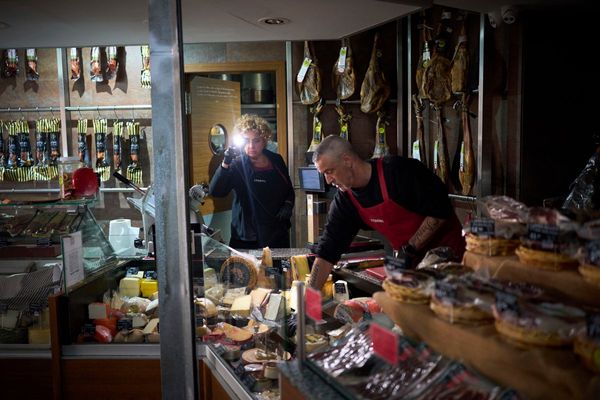/https://static.texastribune.org/media/files/7f88aa0762aa92d2f48d97a828e1ae0e/0110%20Lege%20Opening%20EL%20TT%2017.jpg)
When is a man wearing a dress inherently sexual, and when is it frivolous fun? If you ask Rep. Nate Schatzline, R-Fort Worth, about the time he wore a dress for a school theater project, it was just a joke. But when it comes to other men performing in dresses in bars, that’s sexual.
At least according to a law he’s proposing that would classify places that host drag shows as “sexually oriented businesses,” which comes with additional taxes and licensing restrictions.
House Bill 1266 was assigned to the House State Affairs Committee on Friday, two days after a video of Schatzline wearing a dress surfaced. The video shows the lawmaker frolicking in a black dress along with classmates during his school days.
The years-old clip was tweeted out by Democratic activist Michelle Davis. Democratic groups pounced on the video, pointing out the hypocrisy of Schatzline wearing a dress while filing legislation to regulate drag shows.
The freshman representative dismissed the taunts and chastising on social media in a response to the video.
“The left wing is attacking me over some class project I did as a teenager where my buddies dared me to wear a dress,” Schatzline said in the video.
And on Twitter he said, “That’s not a sexually explicit drag show.”
But Schatzline’s bill doesn’t distinguish between sexually explicit drag shows and a man wearing a dress to perform in a theater, bar, nightclub or other commercial business. Schatzline was unavailable to answer questions sent by The Texas Tribune this week.
Schatzline’s HB 1266 is one of four bills filed by a handful of Texas Republicans that take aim at drag shows. The legislation would broaden which establishments are considered sexually oriented businesses. The bills want to include any establishments that allow performers to wear clothes or makeup that exhibit a “gender identity that is different than the performer’s gender assigned at birth.” Under that definition, Schatzline’s performance — wearing a dress for entertainment purposes — would be defined as drag.
So far, none of the bills define what kinds of clothes or makeup lawmakers consider to be exhibitive of which gender. The lawmakers also haven’t explained why clothes or makeup make someone’s appearance sexual.
In a response to questions sent by the Tribune, Sen. Bryan Hughes, R-Mineola, said in a text message, “Some new language may be coming next week.”
The debate resembles one that has happened recently in Tennessee, where Republican Gov. Bill Lee signed a bill into law Thursday that bans "adult cabaret performances" on public property. That bill defines the shows it seeks to restrict as those that feature "topless dancers, go-go dancers, exotic dancers, strippers, male or female impersonators who provide entertainment that appeals to a prurient interest, or similar entertainers." Before the bill was signed, a photo of Lee emerged online showing him wearing a dress in 1977. Lee dismissed claims of hypocrisy as "ridiculous."
Johnathan Gooch, spokesperson for Equality Texas, an LGBTQ advocacy group, said that plenty of drag isn’t sexual. He also said it’s so broad that it may ensnare businesses and performances that lawmakers aren’t trying to regulate.
“There’s a whole bunch of things that don’t fit neatly into the definition of drag but would fall under the purview of this bill,” Gooch said.
If passed, the legislation would have wide-ranging impacts on small and large businesses around the state — from coffee shops to bookstores and theaters — because it would require them to choose between stopping drag events or taking on additional licensing requirements and taxes. Critics say the proposals stem from the legislators’ willful misrepresentation of drag.
Three lawmakers who authored similar legislation did not respond to the Tribune’s requests for comment.
While drag shows — which most often find men dressing as women in exaggerated styles — have been a mainstay in the LGBTQ community for decades, uproar over the lively entertainment has exploded in recent years as far-right protests led by extremist groups have recruited conservatives to protest these events under the veneer of “protecting children.” They claim the drag performances are sexualizing kids. Schatzline said in a video posted to Twitter the goal of his legislation is to “ban sexually explicit drag shows and preserve the innocence of the next generation of Texas.”
The legislation’s broad characterization would apply to drag shows that have no sexual elements. Organizers of drag queen story hours, where performers read children’s books, often at a library or bookstore, said these events aren’t remotely sexual. Two drag queens the Tribune reached out to did not respond to comment.
Under this legislation, these events and other nonsexual performances of drag queens would be deemed inappropriate for children. The law would force those establishments to be classified as sexually oriented businesses, which would limit where they could operate.
The all-encompassing language of the bills would create significant burdens to small businesses, Gooch said, noting that certain establishments classified as “sexually oriented” are required to pay $5 per customer that enters, regardless of the content of the show. Senate Bill 1018, filed by Hughes — who authored one of the four drag show bills — would increase that “drag tax” to $20 per customer.
Ike Hajinazarian, the Texas Democrats’ spokesperson, said the broad definition of drag could be construed in many different ways and would create headaches for businesses if the legislation becomes law.
“Could a theater put on a production of ‘Rocky Horror Picture Show’?” Hajinazarian said. “Or any number of Shakespearean plays, where women are dressed as men or vice versa?”
Hajinazarian said GOP lawmakers are drawing attention to drag queens to rile up their base over what he describes as “nonissues.”
“Talk about performance,” Hajinazarian said. “That’s truly just clickbait.”
Disclosure: Equality Texas has been a financial supporter of The Texas Tribune, a nonprofit, nonpartisan news organization that is funded in part by donations from members, foundations and corporate sponsors. Financial supporters play no role in the Tribune's journalism. Find a complete list of them here.







